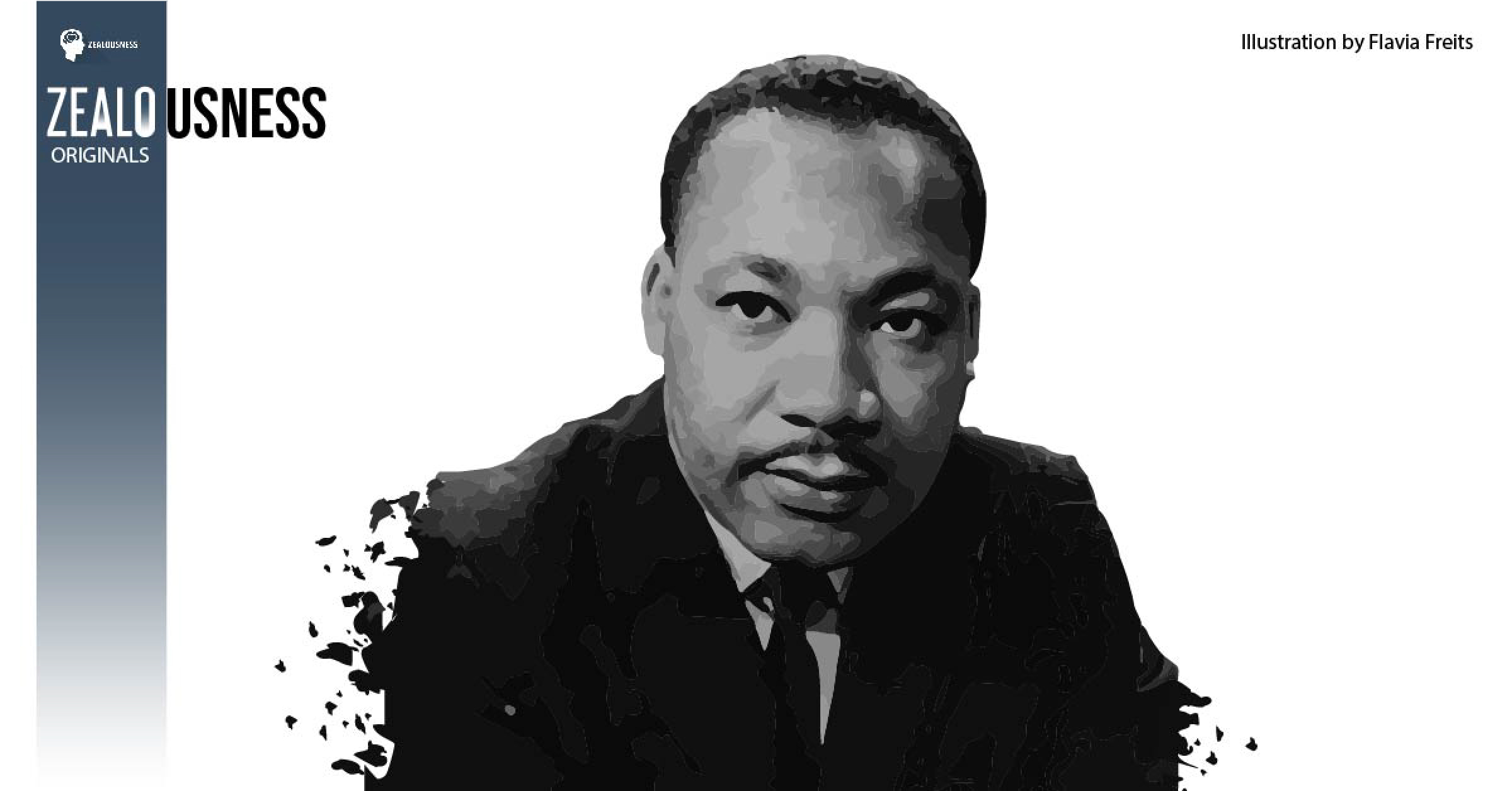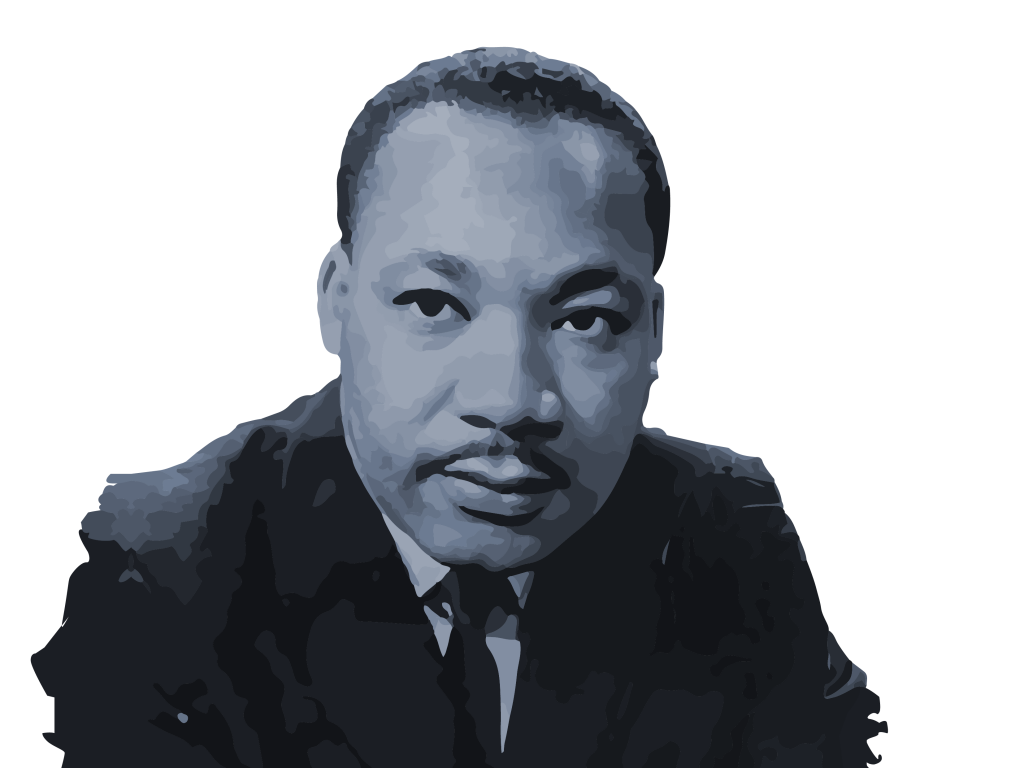“Intelligence plus character — that is the goal of true education.”
Martin Luther King, Jr.
Martin Luther King Jr. was a prominent figure in American society during the mid-20th century. He was a social activist and Baptist minister, who dedicated his life to the Civil Rights Movements in the United States. He was the predominant leader of this movement, aiming to end racial discrimination and segregation in the USA during the 1950s and 1960. He is well known for gaining civil rights through nonviolent methods based on his Christian beliefs and the influence of Mohandas Karamchand Gandhi, an Indian activist who brought a change to India during the British occupation. Martin Luther King Jr aimed to bring equality for all races in the USA, where people must not be judged by the color of their skin, but by the traits of their character.
Martin Luther King Jr. was born on January 15, 1929, in Atlanta Georgia. He came from a religious Christian family; both his father and maternal grandfather were Baptist preachers. He lived on Auburn Avenue, known as “sweet Auburn,” or the bustling “Black Wall Street.” This neighborhood was the home to some of the largest and most prosperous Black businesses and Black churches before the years of the civil rights movement. Experiencing prejudices since childhood when he was not allowed to play with white boys, because they were attending segregated schools.
King was a very gifted young man. He attended segregated public schools and at the age of 15, he was admitted to Morehouse College, where he studied medicine and law. Even though he didn’t plan to join the ministry, following the footsteps of his father and maternal grandfather, he changed his mind due to the mentorship of Morehouse president, Dr. Benjamin Mays, an influential theologian, and racial equality activist. After having finished successfully at Morehouse College he entered the Crozer Theological Seminary in Pennsylvania, earning a Bachelor’s Degree, and was elected president of a predominantly white senior class. Later on, Martin Luther King attended Boston University where he earned a doctorate degree in systematic theology.
King, after living in Montgomery for five years, returned to Atlanta due to the request of the Southern Christian Leadership Conference, where he served as a co-pastor with his father, and helped the Civil Rights Movement in the South. On December 1, 1955, a turning point occurred when a black woman Rosa Parks was arrested for refusing to give up her seat on a bus. Two incidents led to the Montgomery bus boycott, planned by Nixon and King. It lasted more than a year, 385 days, which led to a very tense and exasperated situation. King’s house was bombed, and he himself was arrested during the campaign. It concluded with a United States District Court ruling in Browder v. Gayle which gave an end to this racial segregation of public buses in Montgomery. King’s activism in the Montgomery bus boycott made him a national figure, and one of the best-known spokesmen of the civil rights movement.
With the need for a mass organization to finalize the successful Montgomery action, King founded the Southern Christian Leadership Conference operating throughout the south. He gave lectures across the country on race issues with other religious and civil rights activists. In 1959 he had a meeting with India’s Prime Minister Jawaharlal Nehru and others; discussing with Gandhi and his followers about peaceful noncompliance methods. King was strongly convinced that this kind of resistance was the right weapon toward freedom and equality. Being inspired by the African brothers he believed if they can break free from colonialism, so can the African Americans reach equality.
From the years 1960 to 1965 his influence reached its peak. He caught the attention of the media because he understood that television had the power to nationalize and internationalize the struggle for civil rights, and his well-known methods of active nonviolence (sit-ins, protest marches) influenced many African American and liberal whites across the US, as well as the supports of Presidents Kennedy and Lyndon B. Johnson.
On April 12, 1963, King together with 50 other protesters were arrested in a demonstration as part of the Birmingham Campaign, for the only purpose to bring national attention to the sufferings of the black community in one of the most segregated cities in the USA, Birmingham, Alabama. Actions were taken and failed to achieve results, leaving King and others to more direct actions. King was arrested for the 13th time, with no access to his lawyer until President John F. Kennedy intervened on his behalf. He wasn’t released from jail by his supporters, remaining in jail longer to draw attention to the plight of African Americans. He was criticized by other Christian and Jewish religious leaders whom they consider an outside agitator. He replied in a letter without notes or research, an impassioned defense to his nonviolent and direct actions. In his letter, he criticized the nation’s religious leaders and moderate white Americans for being passive while he and his followers risked everything for a change.
“For those who believed that time will change and solve the country’s racial issues,” King replied with the words of Chief Justice of the United States Earl Warren: “Justice too long delayed is justice denied” and that he could not sit idly in Atlanta because “injustice somewhere is a threat to justice everywhere.”
Later on, that year on August 28, 1963, more than 200,000 people of many races gathered peacefully under the shadow of Lincoln Memorial to demand equal justice under the law for all citizens of the United States. The crowd was uplifted by King’s speech that later became known as “I Have a Dream” speech, where King stressed his convictions that all human beings someday would consider one another as brothers and his children would not be judged by the color of their skin, but by their character. Martin Luther King, Jr. believed that all men are equal and should enjoy the same rights and privileges.
It is thanks to Martin Luther King, Jr. and his supporters that the American people realized the value and power of nonviolent protest. When nonviolence clashed with violence, it gained empathy and support for his cause. The public of the United States caused major acts of Congressional power to set in motion. It is to the merit of King that the Civil Rights Act of 1964 and Voting Rights Act of 1965. The Civil Rights Act prohibited discrimination in the workforce and public accommodations used on “race, color, religion, or national origin.” The Voting Rights Act gave to the African American people the right to vote. Martin Luther King played an important role in the Fair Housing Act of 1968 allowing black people the right to housing, be it rental or sale.
His legacy includes his decisions, actions, and progress for human rights which extends beyond the civil rights movement. A leader of people who never chose fear but courage to fight oppression, ignorance, and violence. He refused prison and other threats to give up his dream. He had a vision for a more diverse America where all people were considered equal under the law. He knew that violence would fit the prejudices people had regarding civil rights activists, for this reason, he chose nonviolence as a tool to reach his goal. He unified the masses for one common goal because the achievement of his goal could not succeed alone, while together he and other activists influenced policies and change nationwide. His leadership contributed to the success of the civil rights movement in the mid-1900 and it still influences the civil rights movement everywhere.
Martin Luther King, Jr changed the lives of African Americans in his time and in the decades to come, his influence wasn’t limited within the American borders, but it transcended his race and nationality, but also the time when he lived. His legacy influenced the apartheid in South Africa, Nelson Mandela used his means to achieve in his country what Martin Luther King did in the USA. Martin Luther King Jr inspired the 1965 International Convention on the Elimination of All Forms of Racial Discrimination which outlaws hate speech and criminalize membership in racist organizations.
His methods changed the world, his philosophy of nonviolence and peace is an inspiration for other civil rights movements. His face and name are synonyms for peace and equality and hope for the oppressed. But in America, we still see discrimination in other forms. Cities that struggle with violence, need for equal pay and opportunity. But in 2008, America elected its first Black president, Barack Obama, something King would have been proud of. King’s name is spoken with pride and his legacy of nonviolence reform has proven that the race war can be settled only this way. His legacy continues to influence today’s protests and civil rights movements. He changed the world for the black community and the global anti-racism cause.
References:
- 17 Inspiring Martin Luther King Jr. Quotes. BIOGRAPHY.COM. updated Jan 28, 2021. Original Jan 12, 2017. https://www.biography.com/news/martin-luther-king-famous-quotes
- Carson, Clayborne. Martin Luther King, Jr. Britannica. Last updated Jan 15, 2021. https://www.britannica.com/biography/Martin-Luther-King-Jr
- Dr. King’s Legacy. MLK50. mlk50.civilrightmuseum.org. , https://mlk50.civilrightsmuseum.org/dr-kings-legacy#:~:text=influence%20change%20nationwide.-,Dr.,remains%20a%20preeminent%20challenge%20today.
- Garrow, David J. Martin Luther King, Jr. HISTORYNET. Published in August 2003. https://www.historynet.com/martin-luther-king-jr
- Gunner, Jennifer. How Did Martin Luther KIng’s Vision Change the World. YOURDICTIONARY. https://biography.yourdictionary.com/articles/martin-luther-kings-vision-change-world.html
- Maranzani, Barbara. Behind Martin Luther King’s Searing ‘Letter from Birmingham Jail’ . History.com, https://www.history.com/news/kings-letter-from-birmingham-jail-50-years-later
- Martin Luther King Jr. From Wikipedia, the free encyclopedia. https://en.wikipedia.org/wiki/Martin_Luther_King_Jr.#United_States
- Written by history.com Editor. Martin Luther King, Jr. HISTORY. Publisher A & E Television Networks. Access date, February 14, 2021. Last updated January 14, 2021. Original Published Date November 9, 2009. https://www.history.com/topics/black-history/martin-luther-king-jr
- Written by the Editors of Encyclopedia Britannica. March on Washington. Recent revised by Jeff Wallenfeldt. https://www.britannica.com/event/March-on-Washington

























2 thoughts on “Intelligence plus character”
Very good information. Lucky me I discovered your blog by accident (stumbleupon). I have bookmarked it for later!
Hmm it appears like your blog ate my first comment (it was super long) so I guess I’ll just sum it up what I wrote and say, I’m thoroughly enjoying your blog. I too am an aspiring blog blogger but I’m still new to the whole thing. Do you have any points for novice blog writers? I’d really appreciate it.